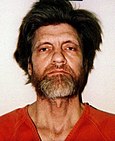Portal:Chicago/Selected biography/49
Theodore John Kaczynski, also known as the Unabomber, is an American mathematician and social critic who carried out a campaign of bombings and mail bombings, killing three people and wounding 23. Kaczynski was born in Chicago, Illinois, and was considered a genius at a young age. He attended Harvard University, and then the University of Michigan, where he earned a Ph.D. in mathematics. He later became an assistant professor at the University of California, Berkeley, at age 25, but resigned two years later. In 1971, he then moved to a remote cabin in Lincoln, Montana. From 1978 to 1995, Kaczynski sent bombs to targets including universities and airlines. On April 24, 1995, Kaczynski sent a letter to The New York Times, promising "to desist from terrorism" if The New York Times or The Washington Post published his manifesto. In his Industrial Society and Its Future (also called the "Unabomber Manifesto"), he argued that his actions were an extreme but necessary tactic to attract attention to the erosion of human freedom necessitated by modern technologies requiring large-scale organization. The Unabomber was the target of one of the most expensive investigations in the Federal Bureau of Investigation's (FBI) history. Before Kaczynski's identity was known, the FBI used the handle "UNABOM" ("UNiversity and Airline BOMber") to refer to his case, which resulted in the media calling him the Unabomber. Despite the FBI's efforts, he was not caught as a result of this investigation. Instead, his brother recognized the manifesto and turned him in. To avoid the death penalty, Kaczynski entered into a plea agreement, under which he pleaded guilty and was sentenced to life in prison with no possibility of parole.

